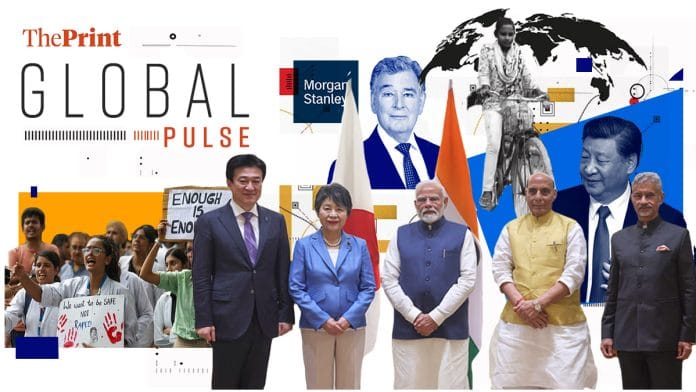New Delhi: India and Japan will look to enhance security cooperation, revise a joint security declaration to address China’s maritime expansion and enhance roles in the Asia-Pacific region at the 2+2 ministerial meeting in India on Tuesday, reports Global Times.
The third meeting-of-its-kind between the foreign and defence ministers of the two countries since 2019 assumes significance in the backdrop of India and Japan looking to deepen relations to counterbalance China, journalist Liu Xin writes in the report.
The experts, whom Xin quotes, opine that while Japan seeks an improved defence network, India wants to diversify its arms imports and that they can give each other a boost. However, differences remain over foreign policy — Japan is a firm ally of the US, but India has consistently held a non-alignment stance, Xin writes.
Of late, Global Times has been keeping a close eye on India-China relations, especially trade between the two countries. Another Global Times report highlights the need for India to strengthen trade cooperation with China to achieve manufacturing ambitions and long-term economic goals.
The global demand for manufacturing bases as alternatives to China has been growing, with India expanding its ports to accommodate increased cargo, reports The New York Times.
In Maharashtra, Jawaharlal Nehru Port is undergoing an expansion with a new terminal, and another project at Vadhvan aims to handle 20 million containers annually by 2035, the NYT reports. These moves mark a significant point in India’s trade landscape as the country pursues an aggressive campaign to catch up, journalists Peter S. Goodman and Hari Kumar write. Jawaharlal Nehru Port is supposed to support the world’s largest ships and reduce costly delays. However, challenges such as port congestion, high shipping costs, and lack of infrastructure persist in India till now, Goodman and Kumar write.
Shashi Kiran Shetty of Allcargo Group tells NYT that the current expansions align with export growth, but dredging and logistics require improvements. “The world doesn’t want total dependence on China,” Jawaharlal Nehru Port Authority chairman Unmesh Sharad Wagh tells NYT. “Definitely, the best alternative is India. Now, people are shifting their base to India.”
The 9 August rape, murder of a 31-year-old trainee doctor at a Kolkata government hospital has brought back memories of the horror of one of India’s most prominent rape cases that took place on 16 December 2012 in New Delhi, according to a piece in The Wall Street Journal. More than a decade later, those protesting today believe little has changed in society’s attitude toward women in India, writes journalist Vibhuti Agarwal.
While the suspect is behind bars, nationwide protests are still going on against gender violence in India and deep-seated societal attitudes towards women, which have not changed over time, writes Agarwal. “The legal regime is in place, but the issue of crime against women continues to be rampant, pervasive and commonplace,” Vrinda Grover, a Supreme Court lawyer, tells her.
In Bihar, young girls are experiencing a transformation in their lives as they receive bicycles through a state government programme, BBC journalist Soutik Biswas writes in his report.
For 15-year-old Nibha Kumari, cycling to school and coaching classes became a critical factor in completing high school, reports Biswas, highlighting a broader trend. A peer-reviewed study in the ‘Journal of Transport Geography’ reveals that cycling among rural girls in India more than doubled from 4.5% in 2007 to 11% in 2017.
The numbers reflect a significant shift in female mobility, supported by state-run bicycle distribution schemes, which have boosted school enrolment and retention at an unmatched scale, writes Biswas. “This is a silent revolution,” the study’s lead researcher Srishti Agrawal tells Biswas while reflecting on the country’s high gender inequality.
Arguing that the now-withdrawn broadcast bill is ‘an exercise in state control’, Nik Sunil Williams writes in his Financial Times piece that the bill granted the Indian government power over content creators and platforms, extending beyond Indian citizens to the global level.
Besides redefining broadcasting to bring online content under its umbrella, the bill, Williams writes, would have forced platforms to proactively and quickly remove content and accounts to escape liability.
Though the backlash against the bill forced the government to withdraw it, Williams writes that the intent underpinning the bill necessitates vigilance over its future. “All that has been signalled is that these particular bills were imperfect vehicles for the government’s plan to censor and control online speech,” he further writes.
Democratic convention starts, Morgan Stanley goes missing
The Democratic convention kicked off Monday with US President Joe Biden speaking in detail about his accomplishments while periodically attacking Donald Trump. To know five takeaways from Day 1, read the The Washington Post report.
Morgan Stanley International chairman Jonathan Bloomer is among those missing after a yacht carrying UK tech entrepreneur Mike Lynch sank off the coast of Sicily during a violent storm, an Italian official has said. Chris Morvillo, a lawyer at Clifford Chance is missing too. For more information, read The Guardian report.
(Edited by Madhurita Goswami)
Also Read: How India and China can beat the ‘middle-income trap’ & why young Indian bankers are job hopping






